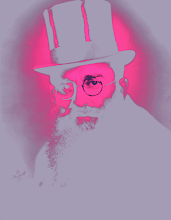
The Doctor is free...for the moment...and what a wonderful opportunity to wax poetic on one of New York's transient sons; Moondog.
Standing on the corner of 54th and 6th avenue dressed in Viking regalia, he was the oddballs oddball. An imposing blind standing with spear in hand as if to refute the 1950's workaday world. He lived on the streets for 20 of his 30 years spent in New York, but Moondog was just more than a visual oddity, he was a street musician of incredible compositional skills. Playing percussion on home made instruments, he welded the Native American drumming he heard as a child with European rounds creating something fresh.
La Monte Young is often credited with being the father of minimalism, if that's the case then Moondog was the milkman. Both Phillip Glass and Steven Reich have sited him as a direct influence and it shows. The intricate percussion pieces of Right and Glass's repetitive keyboard figures are far close to Moondog than Young's one long note approach, yet Moondog was against minimalism.
Recording as early as 1943 on his own private label, by 1953 he had come to release his first mainstream recording: Moondog and his Friends". At this point he was beyond a mere only in New York entity, but a well respected composer, who just happened to like living on his own terms. The "and Friends" Lp showcases both sides of Moondog, the percussive workouts and rounds, interspersed with philosophy lessons. While on side two points to future compositions; Suites for classical strings with a underscoring of rhythmic klip klop drumming. All the while keeping things short. Rarely does a composition of his break the 10 minute mark, keeping the classical rooted in pop.
Please click on the review title for selected track: Suite no. 2 - First Movement in 7/4





 guitar player, composer, conductor, producer, etc. But should they delve further, will they ask who was the best psychedelic keyboard player...I understand that"best" is subjective.
guitar player, composer, conductor, producer, etc. But should they delve further, will they ask who was the best psychedelic keyboard player...I understand that"best" is subjective. 

